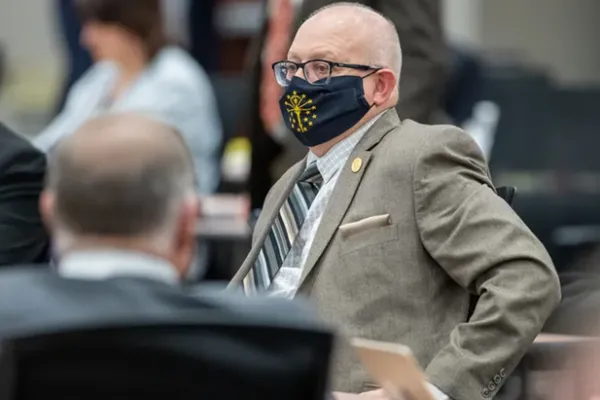More vinyl villages? Lawmaker who builds homes pushes bill to eliminate housing standards

An Indiana lawmaker who builds homes is the sole author on a bill to ban community architecture design requirements, a proposal that could save him and others in his profession thousands of dollars.
Ethics experts say Rep. Doug Miller's involvement in the bill is inappropriate, because of his ownership of Elkhart-based development company Tailor Made Homes and his role on the board of directors for the National Association of Homebuilders.
He also chairs the House committee that passed the legislation, giving him control of that process.
The Elkhart Republican says his goal with House Bill 1114 is to increase affordable housing options for Hoosiers and push back on local overreach. Miller said simply moving the garage door or changing the material on the exterior of the house can generate savings of $15,000.
"House Bill 1114 absolutely strikes a balance between local control and restoring our private property rights," Miller said during a committee hearing, "which is critical in maintaining our hard earned reputation as being one of the most affordable housing markets in the country."
But how much of that savings would be passed on to consumers, instead of pocketed by developers, is unclear.
Leaders in Indiana's cities and towns say the bill would hamper their ability to negotiate quality products and lead to so-called vinyl villages and the mass production of identical — and potentially unsafe — homes, making it challenging to sustain quality of place.
Experts say Miller's involvement in the legislation is a "pretty obvious" conflict of interest, even if it's not classified as such under state law.
"Why not have somebody else bring it forward, if it's that significant of an issue?" asked Abe Schwab, a professor of ethics at Purdue University Fort Wayne.
House Speaker Todd Huston, a fellow Republican, said he did not see an issue with Miller taking the lead on the issue. He offered a common refrain used by lawmakers with potential conflicts of interest, saying that the General Assembly is a part-time job.
"I think people in the legislative body bring their level of expertise and the experiences they've had," Huston said. "Representative Miller is using his unique experiences in that field to bring forward legislation that doesn't directly impact Representative Miller, but the industry and frankly, communities as a whole. This is one where he's just bringing his little expertise."
Miller did not return IndyStar phone calls.
How design can impact affordability
The bill would prohibit a municipality from regulating design elements of residential structures, and would nix those already in effect in places such as Carmel, Fishers and Greenwood.
Accelerate Indiana Municipalities, which represents local governments, argued those very standards are what create quality of place. Other opponents of the bill said removing these rules could lead to cookie cutter neighborhoods or destroy the unique character of certain communities.
Cities could no longer dictate the minimum size a home has to be, what kind of siding a home can have or the size of the garage. Nor could it dictate that it has to have some differences from neighboring houses in order to avoid rows of identical homes.

'The bill would negatively impact municipalities ability to ensure that high quality sustainable housing is being built in their communities," said Jenna Knepper, government affairs manager for AIM. "This bill essentially removes the ability for communities to negotiate design standards with developers and removes an opportunity for constituents to weigh in at the local level."
Citizens Action Coalition argued the bill could strike design standards that target energy efficiency, leading to increased energy costs for Hoosiers.
The bill would allow homeowner associations to impose certain restrictions on architecture.
Builders say design standards have run amok
Builders argue burdensome design regulations from cities — such as rules requiring garages to be side-facing or roofs to have a certain pitch — are partially to blame for higher housing costs in some areas of the state.
Carlie Hopper, a lobbyist for Indiana Builders Association said that the "ever growing list of government regulations" make up 25% of the cost of a new home. For every $1,000 price increase, 4,700 houses are priced out of the market in Indiana, she said.
"By and large, our members are small-business owners doing their best to reconcile the wants and the needs of homebuyers with an ever growing list of government regulations," Hopper said. "Whether it's additional shingles for roofs, a greater roof pitch, another gable or locating the garage on the side of the house or banning vinyl siding in favor another exterior product, it all adds cost and it adds up quickly for first-time homebuyers."
Gina Leckron, state director of Habitat for Humanity Indiana, said many of the people the organization builds homes for are in the service industry. In the middle of a pandemic, the monthly cost savings from choosing cheaper external materials and a less steep roof can make a difference in their monthly payments, Leckron said.
"Make no mistake, this is about affordability and making sure everyone has access to the opportunity of the American dream,"Leckron said. "I think an unintended consequence, when we over regulate these design standards, is we end up legislating the poor out of our communities."
In Schwab's eyes the bill seems to be over correcting for the problem.
"It's really surprisingly far reaching, like why you would prohibit any municipality from doing this?" Schwab asked. "It's dictatorial in a way that's very odd."
Homeowners might not benefit
Opponents aren't sure home buyers would see a windfall. Ryan Hoff, a lobbyist for the Association of Indiana Counties, said lowering costs for builders won't necessarily translate into lower costs for most buyers; the sale point will be what the market can bear.
"There's nothing in this bill that says the builder of that home is selling it below market rate," Hoff said. "They're going to charge what the market will bear for that construction, regardless of what the regulation amounts."
No affordable housing groups testified in support of the bill, aside from Habitat for Humanity, which also would benefit because it builds houses. AARP Indiana, the Fair Housing Center of Central Indiana and Prosperity Indiana — all usually advocates of affordable housing — have not yet taken a stance on the bill.
The executive director for HAND, an affordable housing group in Hamilton County where the need for cheaper housing is high, said anything that reduces the cost of construction should theoretically help, but there are other factors that contribute to lack of affordable homes in Indiana communities.
Land cost, she said, was the No. 1 factor at least in Hamilton County.
"Requiring brick facades or 2,000-square-foot homes or three-car garages or whatever is one of the reasons it can be expensive to build in Hamilton County, but that’s just part of a bigger puzzle," said Andrea Davis, executive director of HAND. "The cost of land is a big hurdle for affordable development — and the hot housing market makes it tough for organizations like HAND to get site control for the 6-12 months we might need to rezone a property, apply for funding, wait for an award and then go through the federally mandated environmental review process."
Conflict of interests
Schwab argued Miller's potential conflict of interest could have easily been avoided. If this is such an important issue, surely another lawmaker could champion it.
"He should be saying to other legislators, 'This is a problem, we need to do this,' and then let them decide," Schwab said, "because they're not going to have a conflict of interest connected to their finances in the way that he does."
Since the 1970s, Miller has worked as a home builder, according to one of his campaign pages. In 2011 he served as President of the Indiana Builders Association, which he said gave him "the opportunity to strengthen and define my advocacy skills for housing." He currently serves as the state representative for Indiana on the board of directors for the National Association of Homebuilders, a lobbying group.
Under Indiana law, members who have a "direct personal or pecuniary interest" in a matter can't author a bill on the topic, but often what that means is open for interpretation. That can create the appearance of impropriety especially in a part-time legislature where nearly all lawmakers have another full-time job.
Some advocates say Indiana's laws on the matter are simply too weak.
Julia Vaughn, the policy director for the political watchdog group Common Cause Indiana, said Millers' case is a "clear cut example" of a policy that would benefit the building industry.
"When somebody sponsors legislation, that is so closely related to their day job, you have to question their ability to be objective," Vaughn said. "While it doesn't fit the narrow definition of a conflict of interest (under House rules), because a lack of any specific financial benefit to Rep. Miller, I think we all should be concerned about the message that it sends to the public."
Schwab argued a better policy would be one that prohibits lawmakers from working on a bill within their own industry.
"We have a cultural issue where conflicts of interest are just not worried about," Schwab said. "That's sort of a broader cultural problem beyond Indiana, but then that's exacerbated by the conditions under which the Indiana legislature operates."
In recent years, experts have pointed to numerous bills making their way through the Indiana Statehouse that appear to have been a conflict of interest.
This year, several lawmakers behind a bill that would eliminate Indiana's wetlands protections — and remove costly mitigation requirements for developers — also have close ties to the building industry, a now influential bloc in the Statehouse. At least eight lawmakers have ties to that industry.
During the 2020 legislative session, an IndyStar investigation found that four House Republicans who helped advance that legislation had ties to the real estate industry.
And in 2019, a lawmaker who employs hundreds of minors at Perfect North pushed to scrap all state child labor laws.
Of course, not everyone has an issue with Miller's ties to the industry.
"Rep. Miller obviously has skin in the game, which isn’t necessarily a bad thing as long as the bill receives hearings and any potential conflicts are disclosed," Davis said. "Indiana has a citizen legislature by design, so it’s natural that lawmakers who have specialized knowledge would try to address issues they see in their industries."
House Bill 1114 is awaiting a vote in the House and needs to be approved by a deadline of Feb. 22. If approved, it would head to the Indiana Senate.
Call IndyStar reporter Kaitlin Lange at 317-432-9270. Follow her on Twitter: @kaitlin_lange.
